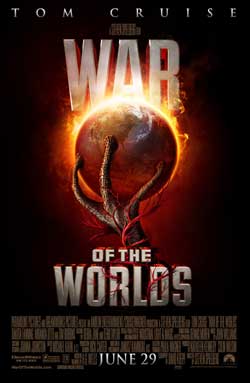 Tom Cruise likes my shirt.
Tom Cruise likes my shirt.
Last week I attended the War of the Worlds junket, which ended with a huge press conference featuring Steven Spielberg and Tom Cruise (we had heard right up until the last minute that Spielberg wouldn’t be there – imagine my excitement when they brought out a second chair. Of course I had already interviewed Spielberg in a much more intimate scenario for Catch Me If You Can, but it’s always exciting to hear what he has to say). I managed to get the first question in, and I stood up with the mic. Here’s how it worked:
"Hi, I’m Devin Faraci from CHUD.com"
"Hey Devin, how are you?" Tom asked, which he would do with every reporter.
"Pretty good. How about you?"
"Great!"
"So Mr. Spielberg – "
"Hey, I just want to say that I love your shirt!"
For reference, it was my official Paul Green School of Rock Music shirt. It’s a pretty cool shirt indeed.
The press conference was interesting. Honestly, I would have preferred having the guys on their own, if only because there’s so much to ask Spielberg. Still, the press was well behaved – there was only one Katie Holmes question and it took 20 minutes to arise. I know how long because Spielberg was timing it. There was a Scientology question and – well, you should read about it yourself in the transcript…
Q: Back when you were prepping ET, it began as a different movie—a scary alien invasion movie and you sort of turned it around and made it into a happy alien movie. At the time, you said that you didn’t want to do a scary alien movie. What’s changed since then and did any of the elements of that film about family also make it to War of the Worlds?
Spielberg: You’re asking what’s changed. There wasn’t anything huge that changed in my life that made me do a scary alien movie. Maybe even the idea that everybody over here said “Well, he’s the guy that only does scary alien movies… I thought well why can’t I try my hand at the kind of film that Ridley Scott made when he did the first Alien, which was my favorite scary science fiction movies of all time. It was just something that I had always wanted to do. We talked about this for a couple years looking for a project to do together that I told him that I wanted to do War of the Worlds ever since I read the book in college before I actually became a filmmaker. I wanted to do some version of it at some point.
Cruise: So you always planned to have ET phone home and bring some of the ET gone gangster.
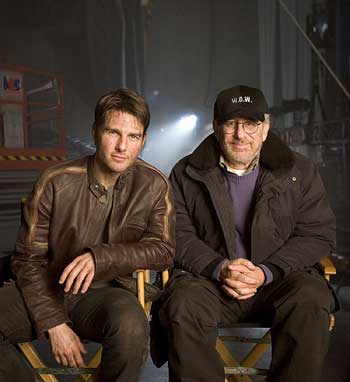 Spielberg: But no, there was nothing really conscious. It was just that it’s a great story. It’s a great piece of 19th Century classic literature. It began an entire revolution in science-fiction and fantasy in my opinion — Jules Verne and HG Wells — and it was a film that was something that I really respected when it was first made by George Pal in 1953 and 1954, and I just thought that we could make a version a little darker like the original novel.
Spielberg: But no, there was nothing really conscious. It was just that it’s a great story. It’s a great piece of 19th Century classic literature. It began an entire revolution in science-fiction and fantasy in my opinion — Jules Verne and HG Wells — and it was a film that was something that I really respected when it was first made by George Pal in 1953 and 1954, and I just thought that we could make a version a little darker like the original novel.
Q: Did any of the elements of that film Night Skies, which is also about a family against the backdrop of an invasion, make its way…
Spielberg: No, nothing from Night Skies made its way into this project.
Q: Father figures are common things…did you enjoy playing a father and to Mr. Spielberg, was this your idea of reversing what you did in Close Encounters with a guy who goes with the family rather than abandoning it.
Cruise: First of all, I have to say that I love how Steven Spielberg deals with families in his movies. I find them to be very real, unique. I’ve always wanted to personally be a father growing up, and when we started talking about the story and we started talking about it being about a father and a family, I couldn’t wait to play this character. And then David Koepp wrote this great character and then Steven – how he directed me in that role – he called me and said we were going to have the 350 GT Engine in the kitchen, you know, and I want the…he has such impeccable notes and that’s why I always show up early in the morning and I always just hang out because I just feed off of it. We’ll be around and he’ll just discover – it happens very quickly creatively with Steven. He has ideas and he discovers things very quickly. We’re always working on the film. But I don’t know, it happens very fast. But you’re asking…I couldn’t wait to be a father in this movie.
Spielberg: Well, I was never really conscious of that. I know that Close Encounters certainly, because I wrote the script, was about a man whose insatiable curiosity. More than just curiosity, he developed an obsession and the kind of psychic implantation drew him away from his family and only looking back once, walked onto the mothership. Now, that was before I had kids. That was 1977. So I wrote that blithely. Today, I would never have the guy leaving his family and go on the mothership. I would have the guy doing everything he could to protect his children, so in a sense, War of the Worlds does reflect my own maturity, you know, in my own life growing up and now having seven children.
Q: The film speaks a lot of levels about refugees and their flight. Is that a theme in the film for you?
Spielberg: Well, it is. It’s an unfamiliar theme to all of us because we don’t often see images of American refugees, except after local and national disasters like hurricanes and people fleeing—and approaching hurricanes in the Florida Keys. And of course, the image that stands out in my mind the most was the image of everybody in Manhattan fleeing across the George Washington Bridge in the shadow of 9/11, which is something that is a searing image that I haven’t been able to get out of my head. This is partially about the American refugee experience, because it’s certainly about Americans fleeing for their lives,being attacked for no reason, having no idea why they’re being attacked and who is attacking them.
Cruise: I like making movies with him because I get to hang out with Steven. I just want to hang out with Steven! The things that he was talking about it in terms of it being a subjective experience, and the choice to never go over that hill and see what’s happening over that hill…
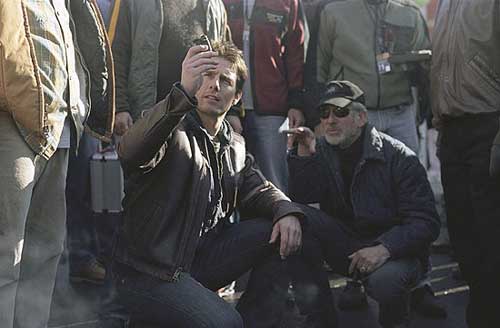
Spielberg: That was a huge temptation, by the way. When I pre-vizzed that sequence, I pre-vizzed going over that hill and seeing the war of the worlds, quote unquote, and I had to pull back and not commit to that, because I thought it was much more personal to the point of view of this family, not to be able to see everything that Hollywood gets to see in most science fiction movies.
Cruise: I’m giving you kind of the actor/fan experience, because I’m a fan of Steven’s films first and then his actor. Seeing him develop these ideas and working on the script with David Koepp. Is David here by the way? Where’s David Koepp! There’s David Koepp [claps] The great David Koepp! An astonishing job, I think, on that screenplay. You look inside that basement for twenty minutes, okay? To be able to choreograph and sustain that kind of tension is something – when I’m working with different filmmakers, I’ll always go back to Steven’s pictures and study his editing, see how he’s telling that story, because he gives you the environment but it’s kept from the character point of view and story. It’s always on that story line, so I often go back and study his stuff again, look at those sequences, and then see him develop that scene in the basement. Even though he pre-vizzed stuff, there’s stuff on the day where he just changed the whole thing on the day or the night before.
Spielberg: David’s back there. You’re confessing this in front of David.
Q: How much did the political situation today have to do with your decision to make this film right now and the happy ending giving a hope to the future?
Spielberg: Because I have hope for the future, which is probably why I’m not the best person to tell a story that leaves you with nothing to look for. But I just felt that this movie is a reflection and there are all sorts of metaphors that you can certainly divine from this story and that’s really – this movie I was hoping would be more like a prism. Everybody could see in a facet of the prism what they choose to take from the experience of seeing War of the Worlds, so I tried to make it as open for interpretation as possible, without having anybody coming out with a huge political polemic in the second act of the movie. I think there are politics certainly underneath some of the scares and some of the adventure and some of the fear, but I really wanted to make it suggested and not that everybody could have their own opinion. But I certainly think I gave you enough rope to hang me with.
Q: The director of the Fantastic Four said something interesting – that he was going to whoop your asses at the box office.
Cruise: I’d like to see that picture do really well, and I want all the movies to do well. It doesn’t matter to me. I’m going to go see that picture. I can’t wait.
Spielberg: I want to go see it with my kids.
Q: This is the second time you work together after Minority Report in 2002. I want to know which film was easier for you and why?
Cruise: I have to tell you personally that it just gets better, the experience working with Steven.
Spielberg: This was 100% character. Minority Report was certainly 50% character and 50% very complicated storytelling – layers and layers of murder mystery plotting, where if any of the actors or Tom even gave a suggestion that he knew what was going to happen next, you the audience would have picked it up like that, because audiences are so smart today. They pick up things so far out of left field that we the filmmakers can’t believe that audiences had picked up on a tiny clue, so we were always concerned about giving away too much of a plot on Minority Report This was experiential. This was a character journey and everything we talked about was about Tom’s character, Dakota’s character, Justin Chatwin’s character, Tim Robbin’s character – all about who these people were an in a sense.
Cruise: I had a lot of fun on Minority Report. I had even more fun on this one. And the next one is going to be even more fun.
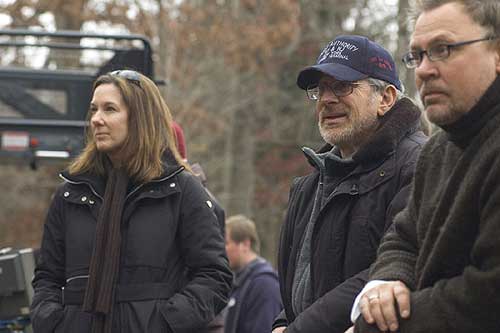
Q: Science fiction has looped into your career on a number of occasions. Can you explain what it means to you as a vehicle to talk about issues that may be important or if it’s more subconscious.
Spielberg: Well, I think that science fiction is not a subconscious thing at all. Science fiction to me is a vacation. It’s a vacation away from all the rules of narrative logic. It’s a vacation away from basic physics and physical science. It just lets you leave all the rules behind and just kind of fly. We as a human race, we don’t fly. We envy the birds. I envy Tom because he actually flies jet planes, and I don’t do that because I’m too afraid to fly. But for most of us who don’t, science fiction gives me a chance to really soar and this is why I keep coming back to science fiction. There are absolutely no limits to where the imagination can go. Now the challenge of science fiction is to tell a credible science fiction story, you have to then turn around, having said all that, and impose certain limits. And I’ve imposed limits on my self. There are a lot of directors that could have taken this story that didn’t, because it would have made it almost too fantastic. This could have been much more like Independence Day or Earth vs. Flying Saucers or it could have been much more about the army vs. the extraterrestrials. There could have been huge battle scenes and tripods going down and soldiers blowing up. I didn’t want to go there. I wanted this in a strange way to be a little more of a cousin to Saving Private Ryan in the genre of science fiction, in the way that it’s more of a story told in a first personal point of view. So I did impose limits and David Koepp imposed limits on how we shaped the screenplay and how we caused all the characters to seem as realistic and normal as we are. And that was very important to me. But science fiction, as a genre, is the great escape for moviemakers.
Cruise: No, I just dig going to science fiction movies, always have. You look at science fiction and the role that science fiction has actually played in our culture because they were dreaming and pushing for the space race. It was the science fiction writers during that pulp fiction era that were writing about space, and then creating that trying to get them to not think about blowing each other up. Let’s get the race going. I find it fascinating when we were preparing Minority Report, the research that Steven had done – now, the scrubbing the image, actually Steven came up with that idea. I don’t know if you’ve noticed but now, they’re doing that. They’ve created that.
Spielberg: Science fiction can sometimes suggest cool ways of exploring the universe. The astronauts are completely inspired by science fiction as kids and they want to join the space program. Science fiction has done a lot, I think, to encourage the people who really have to spend the money at NASA to go out into space. Star Wars and 2001: A Space Odyssey did amazingly positive prep work in that field but also…
Cruise: I wonder if the astronauts are going to use War of the Worlds to try to raise money to go out to make sure we don’t get invaded.
Spielberg: I don’t know. It all depends if we’re going to take the Reagan Star Wars thing out of mothballs and put that up again. I just think that the whole field of science fiction, as Tom was saying, and science fiction stories, it really inspires young people to think and imagine and think that anything is possible. My movies go from historical dramas to science fiction. I love going back and forth from history where I really am contained and I have to pretty much be more of a reporter, a photojournalist, then an imagineer, and science fiction, where I don’t have that many constraints on where we take these stories.
Q: One of the things changed from the novel was having the aliens laying dormant for eons rather than coming out of the sky…
Cruise: I was there when he came up with that idea. It was instantaneous. I remember that. I thought it was a great idea, because the machines are lying dormant.
Q: So what resonance did that have for you as a Scientologist?
Cruise: In what way?
Q: Well, in that some of the tenets of Scientology deal with the past of aliens on this planet…
Cruise: That’s not true.
Q: No?
Cruise: You’re like “Huh? What?” What paper are you from?
Q: Boston Phoenix.
Cruise: Boston what?
Q: Boston Phoenix.
Cruise: Is that… okay… a good paper? I don’t know how to answer that. It has no resonance whatsoever. There’s absolutely no relation to that whatsoever.
And if you’re interested in Scientology you should read Evolution of a Science. I don’t know if you’ve ever read that, or Fundamentals of Thought. That’ll give you a greater understanding of what Scientology is. Read that for yourself.
Spielberg: That idea. That was just something that I came up with and I came up with it just because I didn’t want to do the old death from above cliché that we’ve seen so often in science fiction movies where you look up at the sky and it’s raining down terror and death on you. I thought it was much more logical that this could come – this growth could have been living with us inside of our earth for eons before the time was right and they made their plans. And so, I just thought that was more of an original way of introducing a threat not from above but right from where we least expect it to come. And sort of an extraterrestrial threat almost from the inner reaches of earth.
Q: What do each of you believe is real as far as alien life forms on other planets. Is it out there?
Spielberg: Yeah, it’s definitely out there. You know that. I think we all know that we’re not alone in the universe. I can’t imagine that anyone believes that we’re the only intelligent biological life form in the entire universe. I certainly can’t imagine living without that belief that there’s life, that the universe is teaming with life.
But I’m a little less sure in my ‘50s then I was in my late ‘20s whether we actually have ever been visited. I used to answer this question back in the days of Close Encounters in the ‘70s – wow, was I convinced that we had been visited. And you know why I’m not as convinced right now? Because of the millions of video cameras that are out there today that are picking up less photographs videos of UFOs, alleged UFOs, than have been picked up in the ‘60s and ‘70s and ‘80s. Why is it that there’s 150% more video cameras on the face of the planet today, why we see less from there. Maybe we’re in a cold spell or a UFO drought.
Cruise: I think it’s supreme arrogance to think that we’re the only in all the universe and universes. I’m a very practical person, so unless I meet them someday… I don’t know. It was fun, because of course, when we were on the set, all of us – me and Steven – we’d all go “Okay the aliens would come down here,” and we’d be very intense in between the takes and Steven, Dakota and I and Tim would all look at each other and go “Aliens…oooooooh!”
Spielberg: Something about Tom had said something about this is whistling in the dark because we actually scared ourselves.
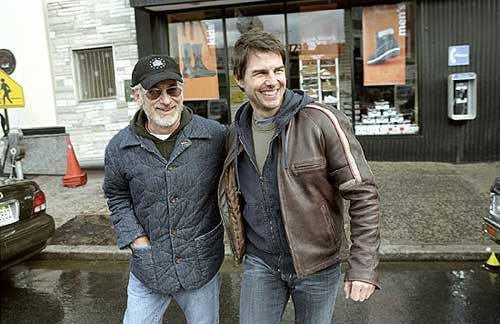
Q: What was the most difficult thing for both of you making this movie?
Spielberg: The most difficult scene for me was a scene I worried about the most because it involved the safety of several thousand local extras, where we were shooting in Athens up the Hudson River, and that was the ferry scene. That was the most difficult scene for me because we had to have thousands of people running and I was terrified of someone falling, tripping, being stepped on, being run over and thank God because we had such a great stunt coordinator and we had so many dozens of stunt people actually inside the crowds, and we had many safety meetings with the crowds, nothing bad happened. But I was on edge for four days because of the vast amount of crowds, at night, running on very narrow streets. So that, for me, was the most anxious time in filming and I couldn’t wait for those scenes to be over and I was happy every time we finished a take and everybody was okay.
Cruise: One thing I just want to add to that which is kind of astonishing to me, having obviously made a lot of movies, produced a lot of movies, was how accurate and quickly Steven shot those sequences. It’s kind of stunning.
For me, what was the most difficult? I don’t know really. Honestly, I had a lot of fun making the movie. There wasn’t a day…the most difficult, hardest day was the last day of shooting because it was over, because I really do sincerely love working with Steven. I have great admiration, which you know, and I just knew that I was going to miss it. When David Koepp wrote this screenplay, I had to say it was the best screenplay I’d ever read. I told David this. You could just see a man inspired. The story flew off the pages…I actually received 84 pages and I could tell with Steven – Steven was like “Oh, I’m going to send it to you” and I was like “How is it how is it How is it how is it How is it how is it?”
I can be quite an excitable person. I don’t know if you know that about me. [laughter]
He said “Oh, just read it and call me afterwards”. I read 84 pages and when it was over…I tell you I was jumping on the couch!
Spielberg: I don’t know. It was only on the telephone for me, but I could hear the springs squeaking.
The first thing we both asked David was, “When do we get the rest?” and David was like “Oh, it will show up in two months”
Cruise: When we ask when he’s going to have it “oh, a couple months” and there it was. So thank you, David Koepp. Thank you, sir.
Q: Dakota Fanning is so amazing in this film. What’s it like working with her? Does she remind you of Drew Barrymore?
Spielberg: I think we all agree that Dakota Fanning has a gift. She has an incredible, extraordinary gift that thank goodness she does not question and she absolutely does not know how to answer questions about it. And that’s also her gift. That she’s unaware of how talented she is and how quickly she understands the situation in a sequence, how quickly she sizes it up, measures it up and how she would really react in a real situation and tells you the truth every time I say “action”. She just tells you the truth. It’s extraordinary to see how consistent she is in her pure, unadulterated honesty.
Cruise: She’s just …she’s lovely. You look at the Beach Boys sequence – you can hold her in two shots of masters. She’s just enormously talented and so fun to work with also. Steve and I had so much fun. It was her birthday and we had pink balloons and Cold Stone ice cream. Because you can have a laugh with her too, where you work and just see that very unique talent. Also, she’s just a really terrific person. She has impeccable manners too. She’d write thank you letters and it’s just very sincere.
Spielberg: She communicated with all my kids. All my kids are huge fans of hers. My little girls were sending her notes and she was answering every one of them and sending them right back through me. We had a whole mail service going between my two daughters and Dakota the whole movie. It was amazing. I have to tell a story. She really knows how to play with this guy [Cruise]. So we’re going to do a scene and it would all be blocked and Dakota would say “Is it okay if I stand right here” [moves in front of Tom] [laughter] This little routine began…
Cruise: So we’d start teasing each other.
Spielberg: Dakota had a close-up and the camera’s right here and I say “Action” and Tom puts his head like [puts his hand in front of his own face] They had this little sparring thing going.
Cruise: She was just fun. You can just really..
Spielberg: You talk to her like we talk to each other. You don’t talk to her like a child. And by the way, I never talk to children as though they were children, especially in my professional work. I never talked to Drew like she was 6 or 7 years old. There are certain kids that are so smart that they understand what you’re saying. You don’t have to perform for them at their level.
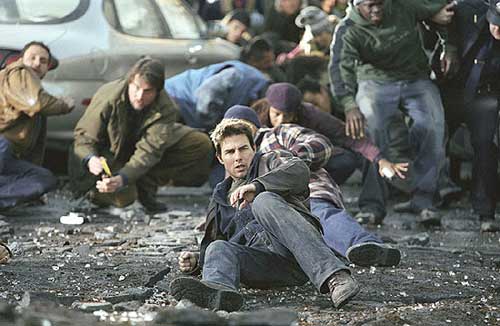
Q: The box office has been in a slump. What do you think that theaters need to do differently to help the box office?
Spielberg: I don’t believe this is the exhibitor’s responsibility. The exhibitors don’t have to tweak their theaters. We don’t have to find a new platform or medium to communicate our stories with you. We don’t necessarily have to build screens three times bigger. We don’t have to IMAX out this world. We just have to make the kind of movies that you want to see. If the box office is in a slump, I don’t believe it’s because people are watching cable or playing their video games so much; I really don’t believe that. I believe that when the right movies come along, people will show up for it.
Q: Are you stunned or puzzled by criticism that love or religion might distract from the movie?
Cruise: No. I really don’t pay attention to it. It doesn’t bother me, you know what I’m saying? I just really don’t pay attention to it. I do my work. I live my life. It’s never affected anything before. It doesn’t matter. What do I do? I make my movies. And I live my life the best way that I feel that I can. I can’t control what people are going to say or do. They can say or do what they want. But it’s not going to change the way I live my life?
Q: Would you personally run toward the tripods, or away?
Cruise: I would run. [Laughs]
Spielberg: Run! [Laughs.] I don’t know. There could have been another kind of movie. There could have been a 1980’s-Tom Cruise-version of War of the Worlds, where Tom Cruise runs toward the tripods.
Cruise: And then I get in a jet.
Spielberg: Get some sidewinders…
Cruise: I don’t know what I’d do. It’s different with kids. You’d run with them.
Q: What happens when the two of you disagree?
Cruise: We’ve never actually had a disagreement. I so respect his opinion, his judgment, that when he has an idea, I’m always interested in exploring it.
Spielberg: Yeah, we’ve never had a disagreement. And also, what usually happens in the whole process is that I’ll give Tom an idea, and to Tom, an idea is a gift. When he hears an idea, it’s a total surprise, and he’ll cover thousands of acres and figure out a way to take that idea and make it his own. And I’m the same way. Tom will come to the set—he’s never like, “I want to do something that’s not in the script,”—but he’ll be like, “Hey, can I kinda just try this? I have this idea I want to throw out. Can I try this song to my daughter, because I haven’t been able to understand what the nursery rhymes mean? But can I try a song that I like, that might be associated with cars, since I’m the car guy in the movie?” That was Tom’s idea. He brought that to the movie. Those are the kind of ideas that I try out. Movies, they evolve. You start with a screenplay, and then you evolve from there. And so every single day, there are 15, 20 moments of discovery. That makes the movie come to life.
Cruise: Those are the fun moments. That’s why I do show up early. I like to hang out and to let Steven see me on the set, and it gives you ideas, and it gives him that time and that room for ideas. Sometimes when we’re making a movie we’ll watch scenes from other movies just for fun, on the set. The drill sergeant speech from Full Metal Jacket. We didn’t listen to Full Metal Jacket when Dakota was on the set. It was like, “Is D on the set? Is D on the set? Okay, D’s in school! Full Metal Jacket! That scene from The Fly!”
Spielberg: It’s just a way of cleaning the palette. One of the biggest problems in making movies—I’m sure other filmmakers have told you this at press conferences—is that directors tend to lose their objectivity. You get halfway through a film, and you forget why you’re making it, what the story’s all about, and you’ve got to read the script again. So sometimes those little moments of taking a break from the picture while the cameraman is widening the shot, and just going off and watching a great scene from a European or American motion picture is a great way to clear the air.
Q: Tom, every cast member says that you have unbelievable energy. Is there a secret to your boundless energy?
Cruise: My interest in life, quite honestly. I’m interested in life. I’m someone who will get excited about living. I’m interested in people. There are things in my life, in Scientology, and tools that I’ve spoken about before, that help me to overcome barriers and problems, and that has been extraordinary in my life. I have the privilege of doing something that I love. I do see it as a privilege. I’m truly proud of the life that I have.
Spielberg: And I have half his energy, and I’m still going strong.